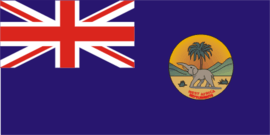British West Africa
British West Africa was the collective name for British colonies in West Africa during the colonial period, either in the general geographical sense or more specifically those comprised in a formal colonial administrative entity. The United Kingdom colonised varying parts of these territories or the whole from the late 1780s until the 1960s. From west to east, the colonies became the independent countries of the Gambia, Sierra Leone, Ghana and Nigeria.
Historical jurisdiction
British West Africa or the British West African Settlements constituted during two periods (17 October 1821 until its first dissolution on 13 January 1850 and again 19 February 1866 till its final demise on 24 November 1888) an administrative entity under a governor-in-chief (comparable in rank to a Governor-general), an office vested in the governor of Sierra Leone (at Freetown).
The various colonies were established to aid the efforts of the Royal Navy's West Africa Squadron wresting of control from various polities' resources, cultures and highly profitable exports. Coaling stations and depots were built in the coastal villages and because many people lost their lands, businesses and livelihoods, low wage jobs that were created as a result of resource exploitation were all that was left for many from the local population. Consequently, regional immigrants looking to start a new life joined the population, adding to the expansion of preexisting existing cities and villages.
The other colonies originally included in the jurisdiction were the Gambia and the British Gold Coast (modern Ghana). Also western Nigeria, eastern Nigeria and northern Nigeria.

Social and cultural development
British colonisation of West Africa had a dynamic effect on social and cultural development.
British West Africa's present makeup includes Ghana), Sierra Leone, Gambia, Western Nigeria, Eastern Nigeria and Northern Nigeria. Each of these countries and areas are a post-colonial period, or what the Ghanaian writer Kwame Appiah dubs neo-colonialism.
British West Africa's development was solely based on modernisation, and autonomous educational systems were the first step to modernising indigenous culture. Cultures and interests of indigenous peoples were ignores. A new social order, as well as European influences within schools and local traditions, helped mould British West Africa's culture. Significant was the British West African colonial school curriculum. Local elites developed, with new values and philosophies, who changed the overall cultural development.
In terms of social issues with British West Africa; sex and race usually conflicted each other. (Carina E. Ray called it the "White Wife Problem"). During British West Africa's history, interracial relations were frowned upon, and couples might be discriminated against. Black men were often accused of taking the jobs of white British men (mostly port workers) jobs as well as stealing their wives. White women were seen as immoral traitors who put their own selfish sexual desires over the good of their nation. There were even certain policies that deported the wives of these relationships back to Britain and denied them access to any of these colonies.
Economic development
Colonial banks might develop monopolies to control competition, at the expense of British West African citizens. There were only two major banks that operated in British West Africa: Barclays and the Bank of British West Africa. They had major economic and financial influence in British West Africa from about 1916 to 1960. From a dependency theory view point, these banks took advantage through price fixing and certain unfair regulations.
Coverage of West African economics by historians, mostly British, has left a legacy of controversy. Three historians, in particular, were accused by Adu Boahen for inaccurate reportage, mainly of Gold Coast and Ghana: William Walton Claridge, in A History of the Gold Coast and Ashanti (1915, reprint by Frank Cass in 1964); William Ernest Frank Ward in History of the Gold Coast (1940, published 1948, as A History of Ghana in 1958); and John Donnelly Fage in Ghana, An Historical Interpretation.
Economic development was mostly attributed to each region's agricultural developments. Development of the financial markets through colonial banking often disadvantaged the colonies as producers of commodities.
Aftermath
Even after its final dissolution, a single currency, the British West African pound, was in effect throughout the region -including Nigeria- from 1907 to 1962.
Nigeria gained independence in 1960. Sierra Leone was self-governing by 1958 and gained independence in 1961. Gambia gained independence in 1965. In 1954, the British Gold Coast was allowed by Britain to self-govern and in 1957, the Gold Coast was given independence from Britain, under the name Ghana.
See also
- British colonisation in Africa
- European colonisation in Africa
- Scramble for Africa
- West Africa cricket team
References
External links
| Wikimedia Commons has media related to British West Africa. |